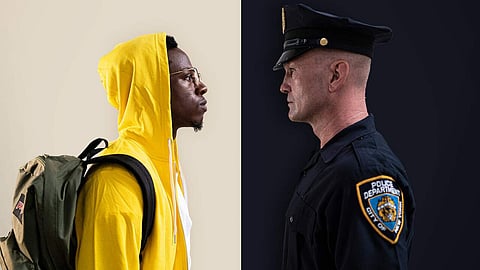Two Distant Strangers Movie Review: Groundhog Day meets Fruitville Station in this timely short
Rating:(4 / 5)
Set in New York, Carter wakes up next to a black woman he met the previous night, Perri (Zaria Simone), on a perfectly normal day. On his way back home, he runs into a suspicious Officer Merk. For no specific reason apart from Carter’s skin color, Merk asks him to step aside for frisking, and when the former resists, things swiftly turn ugly with Merk and his subordinates pushing Carter’s face against the ground in a chilling recreation of Floyd’s murder. In the thick of suffocation, a struggling Carter utters Floyd’s final words, “I can’t breathe,” before falling unconscious and consequential dying. Had the film ended here, it would have still made for a potent, disturbing watch, but this is where the story draws out tricks from its sleeve. Carter wakes up next to Perri, again. As he walks through the street with a strong feeling of Deja Vu, Officer Merk stops him and their interaction ends with the police officer killing the black man, once again.
Carter and Merk are stand-ins for the black victim and white preparator, respectively. When Carter addresses Merk, he represents his entire community, and the dialogues are written in a way to aid us in discerning the macroscopic perspective the film offers with its two primary characters. Akin to Phil Connors, who gets stuck in an endless loop in Groundhog Day, waking up on the same day, Carter keeps living the same day over and over again with his fate, however, resembling the real-life tragedy of Oscar Grant from Fruitville station.
When Carter says Merk that they are stuck in a cycle, he is referring to the plight of innumerable innocents on whom police brutality befell like a curse. The film paints a beautiful, haunting, and comprehensive picture of oppression by taking us on a ride of varying emotions. It begins like a meet-cute romance, curtly becomes a blood-boiling tragedy, and then it turns into a drama embedded with scathing commentary, and it does it seamlessly. Halfway through the film, a chaotically edited sequence collates all of Carter's deaths, embellishing the different ways he is murdered. Logically, it certainly comes across as exaggerated, but the film elucidates the blacks’ inescapable fate, and it succeeds in doing it at every step.
Early in the film, we see James Baldwin’s The Fire Next Time. In an interview dating back to 1969, Baldwin said, “(The police) are a very real menace to every black cat alive in this country.” He added, “It could happen to my mother in the morning, to my sister, to my brother…” Likewise, every time Carter is killed, his murder represents several of the names the film pays respects towards at the end, which, despite gnawing injustice and tragedy, is bound to leave you suffused with hope for a better reality. Being a film that scowls at the cynical reality, the hopeful ending nudges us that films can always be a ray of light in the otherwise grim world they are holding a mirror to.
The eponymous strangers are distant in every way possible but the film proves that they are bound by the tissue of racism that has ingrained supremacy. Even the title screams duality.

